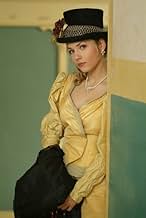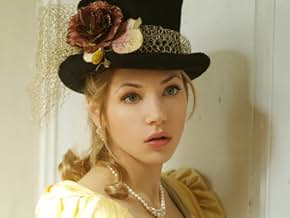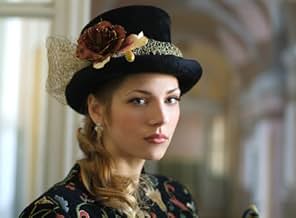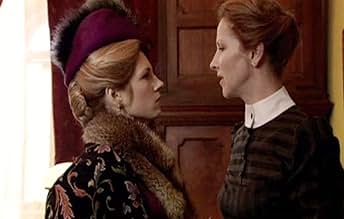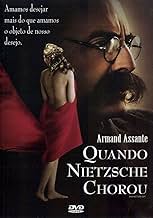PUNTUACIÓN EN IMDb
6,4/10
5,1 mil
TU PUNTUACIÓN
Añade un argumento en tu idiomaViennese doctor Josef Breuer meets with philosopher Friedrich Nietzsche to help him deal with his despair.Viennese doctor Josef Breuer meets with philosopher Friedrich Nietzsche to help him deal with his despair.Viennese doctor Josef Breuer meets with philosopher Friedrich Nietzsche to help him deal with his despair.
- Dirección
- Guión
- Reparto principal
Michal Yannai
- Bertha
- (as Michal Yanai)
Ayana Haviv
- Singer - 'Hymnus an den leben'
- (sin acreditar)
Reseñas destacadas
It is not a great movie. It is not a masterpiece. It may be boring and fake at first sight. But... A film about a Nietsche. Not very different of the philosopher. The character is seductive, power and Armand Assante is brilliant in his skin. The atmosphere is carefully recreated. Colors, gestures, social conceptions are pieces of a small visual museum. So, the movie is a good introduction to understand the shadows of XIX century end. For look the existence with the eyes of men of a special way to discover the essence of to be. Certainly, the film gives only sketches of great people. Lou Salome is more than strange muse of a philosopher and Nietsche is prophet in another sense than the character. No bad, no extraordinary. Only good subject of reflection. And introduction to cultural scene.
Knowing nothing of the book, and based solely on the DVD cover and description I expected a disappointingly shallow, titillating pseudo-intellectual romp through the fields of pretense. But the portrayal of the rare humanity of these characters as they confronted their obsessions and limitations drew me into rapt attention at the next plot development. Perhaps I'm just shallow and easily amused, but this story gave a fairly good look at a decent man, Joseph Breuer, and his struggle to really feel his humanity. This is an important story, one rarely told because how many story tellers have been through the fire of transformation to live for real? Where do you find an audience willing to sit through something they're desperately trying to avoid themselves? Maybe package it as a shallow and titillating pseudo-intellectual romp. Sure there were times when I saw through the weave of the story, for a moment I even saw Assante speaking lines rather than Nietzsche talking but for the most part this story was to me a real story of people really evolving right before our very eyes. That's not something you're going to see every day.
Its not a tremendous film, a must see, of a picture at his own, When Nitszche Wept is very good driven style of fan fiction, that manage to get us near to a lot of Niche, and Freud, concepts -but in reality is only near, because as lots of book-film adaptations, it takes a to much of the director's point of view-, it gets it right in some moments and is not a waste of time at all, but it suffers from his flaws, the nature of art, is specific to each category it belongs, this is most like and homage, and want us to remember very important things, and don't care about being very technical with the acting, the passing, or the writing itself, it's made great with the cameos that it have, and the good vibe the producers have toward those beautiful mind that they were, but maybe fails, to stand alone as film,
This movie is surreal. Literally, it has a lot of surrealistic scenes to mess with your mind, but also the whole presentation is surreal because there are so many bizarre angles. At its heart, it's a sober portrayal of depression and humanity's discontent (so you'd think it would be slow & heavy). But mostly it's humorous, at times as silly as the movie "Airplane!". It also features historical references, but you can't help feeling that the writer is being deliberately playful, distorting facts right before our eyes with a wink and a smile. In all, I think it's an entertaining experience, especially if you don't take it too seriously.
It definitely has the qualities of a period piece romp, like maybe "Casanova" (2005), "Molière" (2007) or one of my faves, "Impromptu" (1991) about Chopin. But "When Neitzsche Wept" has a more subtle tone which prevents me from saying it's intended to be a comedy like the others I mentioned. Also, don't expect a biopic because it's not really about any particular man so much as it's about everyman's internal struggle between passion (freedom) and logic (duty).
This film takes a somewhat light-hearted approach to a very dark subject, and I think that's what makes it unusual and clever. It's entertaining and digestible, but also there are a few powerful monologues delivered by Neitzsche (Armand Assante) that I had to rewind and hear again because they seemed to appear out of nowhere. Then suddenly we're back to a crazy scene of a redhead woman in diapers jumping around a crib. Don't worry, it all makes sense; it's just... surreal!
It definitely has the qualities of a period piece romp, like maybe "Casanova" (2005), "Molière" (2007) or one of my faves, "Impromptu" (1991) about Chopin. But "When Neitzsche Wept" has a more subtle tone which prevents me from saying it's intended to be a comedy like the others I mentioned. Also, don't expect a biopic because it's not really about any particular man so much as it's about everyman's internal struggle between passion (freedom) and logic (duty).
This film takes a somewhat light-hearted approach to a very dark subject, and I think that's what makes it unusual and clever. It's entertaining and digestible, but also there are a few powerful monologues delivered by Neitzsche (Armand Assante) that I had to rewind and hear again because they seemed to appear out of nowhere. Then suddenly we're back to a crazy scene of a redhead woman in diapers jumping around a crib. Don't worry, it all makes sense; it's just... surreal!
Fine production values, a dry sense of humor throughout, literate script, decent casting (Assante transcends his usual "heroics" and plays a crumbling soul nicely and Cross is always workmanlike and solid), and, slyly, the film (as the book did) finally gives Nietzsche credit for inventing modern psychoanalysis (since Freud, et al, in the field stole from his works outrageously and lavishly, without assigning him the proper credit for his startlingly original insights into the world-historical human, all too human capacity for self-deception).
A tough work for an adaptation, but this movie succeeds where something like "Freud" dismally collapsed into timid clichés.
Nietzsche would have gotten many a devilish laugh out of this work's visual craftiness.
And appreciated being treated, not as a cartoon "Overman" idol, but a struggling, flawed, tragic-comically-profound human.
"Ecce Homo", his anti-"autobiography" warned those who followed not to take him too seriously.
If this film stimulates a few people to pick up his "Joyful Wisdom" (La Gaya Scienza) or "Dawn", it will have made its honorable point.
Yalom was, in essence, giving Nietszche a posthumous brother's embrace for his loneliness and struggle and brilliance and scorn and lack of recognition while he lived.
This movie does the same.
To a guy, who, friendless and abandoned and ignored through much of his writing life, still affirmed the Universe and humanity in the words:
"Man would rather have the Void for a purpose than be void of purpose." -F.N.
Worth a viewing.
A tough work for an adaptation, but this movie succeeds where something like "Freud" dismally collapsed into timid clichés.
Nietzsche would have gotten many a devilish laugh out of this work's visual craftiness.
And appreciated being treated, not as a cartoon "Overman" idol, but a struggling, flawed, tragic-comically-profound human.
"Ecce Homo", his anti-"autobiography" warned those who followed not to take him too seriously.
If this film stimulates a few people to pick up his "Joyful Wisdom" (La Gaya Scienza) or "Dawn", it will have made its honorable point.
Yalom was, in essence, giving Nietszche a posthumous brother's embrace for his loneliness and struggle and brilliance and scorn and lack of recognition while he lived.
This movie does the same.
To a guy, who, friendless and abandoned and ignored through much of his writing life, still affirmed the Universe and humanity in the words:
"Man would rather have the Void for a purpose than be void of purpose." -F.N.
Worth a viewing.
¿Sabías que...?
- Citas
Josef Breuer: How could I have given up everything?
Nietzsche: You'd given up everything long before you met me.
Josef Breuer: Yes, but now I have nothing.
Nietzsche: Nothing *is* everything. In order to grow strong, you must first sink your roots deep into nothingness. Learn to face your loneliest loneliness.
Selecciones populares
Inicia sesión para calificar y añadir a tu lista para recibir recomendaciones personalizadas
- How long is When Nietzsche Wept?Con tecnología de Alexa
Detalles
- Fecha de lanzamiento
- País de origen
- Sitios oficiales
- Idioma
- Títulos en diferentes países
- Nietzsche - Un viaje a las profundidades del alma
- Localizaciones del rodaje
- Empresa productora
- Ver más compañías en los créditos en IMDbPro
- Duración1 hora 45 minutos
- Color
- Mezcla de sonido
- Relación de aspecto
- 1.85 : 1
Contribuir a esta página
Sugerir un cambio o añadir el contenido que falta

Principal laguna de datos
What is the Spanish language plot outline for El día que Nietzsche lloró (2007)?
Responde

